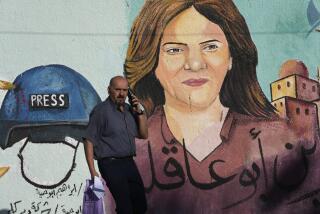Slain Writer Was Investigating Graft
BAGHDAD — Journalist Steven Vincent collected facts for his stories from the streets of Basra, not from official statements. But he knew that the streets of Iraq’s second-largest city were becoming increasingly unsafe for him.
“This is not the easygoing municipality of 1.5 million people I recall,” he wrote in a June 9 article for National Review Online. “For one thing, I can no longer wander the streets, take a cab or dine in restaurants for fear of being spotted as a foreigner: Kidnapping, by criminal gangs or terrorists, remains a lucrative business.”
Still, Vincent persisted, on a personal mission to uncover the dark political underbelly of Basra. He wrote about it, and some think it may have cost him his life.
The 49-year-old former arts writer was abducted Tuesday night from a downtown Basra street along with Nour al Khal, an Iraqi woman who was his longtime assistant and interpreter. Vincent’s body was discovered before dawn, hands bound and shot five times; Khal is being treated for multiple gunshot wounds in a Basra hospital.
Dozens of foreign journalists have been abducted or killed in Iraq since the 2003 U.S.-led invasion to oust President Saddam Hussein. But Vincent’s death has new, disturbing implications; he may not have been killed because he was an American or a journalist. He may have been targeted because he was uncovering alleged corruption and influence-peddling in the city’s political, security and religious leadership.
Multiple witnesses attest that Vincent and Khal were abducted by men who appeared to be driving police vehicles.
One witness, who refused to give his name, said he recognized one of the abductors as an Interior Ministry employee.
“The man also recognized me, after I saluted him,” the witness said. “He said to me: ‘Do not interfere! It is our duty.’ ”
Vincent, a native of San Jose and a longtime New York City resident, was a freelance writer. He had spent several months in Basra working on a book while filing stories for the Christian Science Monitor and the National Review as well as posting on his Web blog, www.redzoneblog.com.
Vincent and his wife, Lisa Ramaci-Vincent, were well regarded in their neighborhood in Manhattan’s Alphabet City, said Joe Evans, a longtime neighbor.
Evans, who has lived in the apartment building for 20 years, said that he and the Vincents and other pioneering types took over the abandoned six-story building, which had only two electric lights and no bathrooms. They worked long hours to rehabilitate it, with loans from public agencies.
“Steve was a great guy, very strong in his convictions,” Evans said.
He recalled that on the morning of the Sept. 11 attacks, Vincent climbed onto the roof of the apartment building and saw the second jet strike the World Trade Center.
“It changed his life,” Evans said. “It became instrumental in him going to Iraq and trying to bring his story out. His weapon was a pen.”
An enthusiastic supporter of the invasion of Iraq, Vincent’s work sometimes took issue with what he saw as the subsequent mishandling by the U.S.-led coalition.
In an opinion piece Sunday in the New York Times, Vincent criticized Britain’s failure to confront the growing influence of religious parties in Basra:
“Security sector reform is failing the very people it is intended to serve: average Iraqis who simply want to go about their lives.... Basran politics [and everyday life] is increasingly coming under the control of Shiite religious groups.... Recruited from the same population of undereducated, underemployed men who swell these organizations’ ranks, many of Basra’s rank-and-file police officers maintain dual loyalties to mosque and state.”
Vincent concludes that “the British seem unable or unwilling to do anything about it.”
Some of Vincent’s colleagues blame the piece for his death. Bruce Wolmer, editor in chief of Art & Auction magazine, wrote in an open letter: “Our longtime staff writer, colleague and dear friend Steven Vincent was brutally murdered in Basra, Iraq, yesterday by what is assumed to be a local religious/criminal militia. The cause was apparent retaliation for Steven’s op-ed piece in the New York Times on Sunday.”
Mitchell Muncy, editor in chief of Spence Publishing Co. in Dallas, which published Vincent’s book “In the Red Zone” last year, said the journalist had succeeded in keeping a low profile until the article appeared. “He was not a household name, at least until this piece was published on Sunday,” Muncy said. “Unfortunately, I guess the bad guys read the New York Times.”
Pentagon officials Wednesday would not draw a direct link between Vincent’s reporting on the extremist presence in Iraqi security forces and his subsequent slaying.
It’s possible that Vincent came to his killers’ attention simply by his unavoidably high-profile presence -- an American journalist digging into taboo subjects in a relatively close-knit community.
Other journalists have addressed the same issues, but none have stayed so long and lived so openly without security. In his blog postings, Vincent spoke of riding in taxis and shopping in public markets.
Vincent’s writing was often uncompromising. In his blog, he aired complaints by Basra businesspeople alleging rampant corruption among the city’s political and business leaders, going so far as to name specific tribes and projects. He expressed a visceral distaste for the treatment of women under the conservative brand of Islam taking hold in the once-liberal port city. “Bedouin customs and religious edicts -- in short, tribal Islam -- is grinding the hearts and souls and futures of thousands of Basran women into the desert sand.”
In the June article in National Review Online, he fumed about increasing restrictions on his movement: “For safety’s sake, I’m tied to my hotel, dependent on expensive drivers, unable to go anywhere without Iraqi escort.”
He mentioned an admonition from the British: “ ‘You really shouldn’t be here at all,’ a British Embassy official warned me.”
Khalil reported from Baghdad and Mulligan from New York. Times staff writers Mark Mazzetti and Johanna Neuman in Washington and special correspondent Othman Ghanim in Basra contributed to this report.
More to Read
Sign up for Essential California
The most important California stories and recommendations in your inbox every morning.
You may occasionally receive promotional content from the Los Angeles Times.










